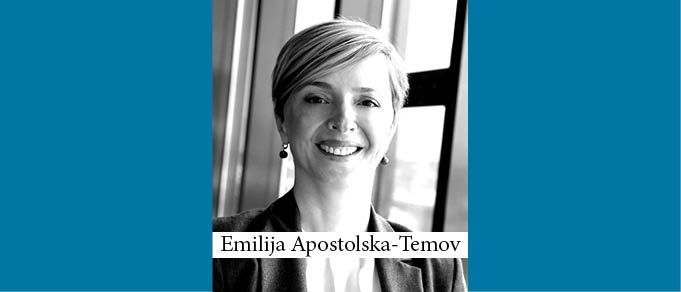“The talk about the entrance of two regional players – CMS and Schoenherr – onto the Macedonian market last year is still on everyone’s lips (among lawyers),” says Apostolska & Partners’ Founding Partner Emilija Apostolska-Temov in North Macedonia, who says that the presence of such law firms in the market will undoubtedly influence business, increasing both the quality of legal services and competition. “It also gives us a hint about investments coming in – such big law firms would not come without any plans,” she says. “They must know something that the rest of us will learn later. I think it will be a positive experience.”
There's news coming from elsewhere in the country as well, Apostolska-Temov says. She reports that, earlier this year, North Macedonia abandoned its old flat taxation system in favor of a new progressive system. While the consequences of the new law have yet to be seen, she notes that, at least for the moment, it “is seen as something not positive for businesses.” She sighs. “We were not given time to prepare, as the law was published and the implementation process started immediately."
The new law imposes higher costs for employers, Apostolska-Temov reports, which may affect foreign investment. For example, under the previous flat system, both personal income and income from other sources, such as royalties, sales, and capital gains, were charged at a consistent 10% rate. The new law introduces two tax brackets and rates, with annual salaries, royalties, income from professional services, and the sale of agriculture products exceeding EUR 18,000 to be taxed at an 18% tax rate. The law also introduced a new 15% rate on income from industrial property rights, capital gains, leases, and so on.
According to Apostolska-Temov, the most affected group will be software development industry employers and employees, who, she reports, “get the highest salaries in North Macedonia.” In addition, she says, “in most labor contracts, regardless whether salaries are gross or net, employers are responsible for covering taxes in case of changes in taxation law.” As a result, she says, “a lot of money will come out from the pockets of employers – and the majority of them are foreign investors.” This, she notes, may make North Macedonia less attractive for foreign investors, as it will be “no longer a tax haven, and investors will move elsewhere.”
On the other hand, Apostolska-Temov notes, there may be a countervailing consideration for potential investors. She points to a growing interest of foreign investors in the cannabis growth and extraction segment, which she says is sparking discussion about the possibility for improved legislation on cannabis extraction. While there are no draft laws at the moment, she says that a change in the current law is possible, and she smiles that, “in such a small country as Macedonia, if there is smoke, there is fire.” If it does come, she says, it is likely to induce more investment. “The current regime is heavily regulated,” she says, as it sets out a long list of licenses to obtain and preconditions to be met. Still, she notes, “this did not prevent investors from finding North Macedonia a good destination for investment in this sector,” and she believes that a new and clearer law, with faster procedures, would be even better.
Finally, Apostolska-Temov reports, a new Law on Public Procurement was adopted on April 1, 2019, harmonizing North Macedonian law with several EU Directives. According to her, one particular element of the law, relating to contract-awarding criteria, attracted the most attention. “In the past low prices were the most prioritized criteria in tenders,” she says. “With the new law, procedures will be more transparent and efficient, and the ways public funds are allocated will be more effective.” She considers this a positive step forward, noting that “the lowest price does not mean the greatest quality.”



























